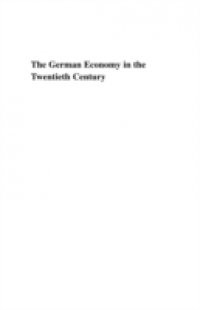The twentieth century has seen Germany transformed from imperial monarchy, through Weimar democracy, National Socialist dictatorship, to finally divide into parliamentary democracy in the West and socialist Volksdemocratie in the East. Pivoting on two World Wars, intense political change has dramatically affected Germany's economic structure and development. This book traces the logic and the peculiarities of German economic development through the Weimar Republic, Third Reich and Federal Republic. Providing a comprehensive analysis of the period, the book also assesses controversial issues, such as the origins of the Great Depression, the primacy of politics or economics in the decision to invade Poland and the future risks to the Weltmeister economy of the Federal Republic oppressed by unemployment, the huge debts of some of its trading partners, and the possibility of worldwide protectionism.

